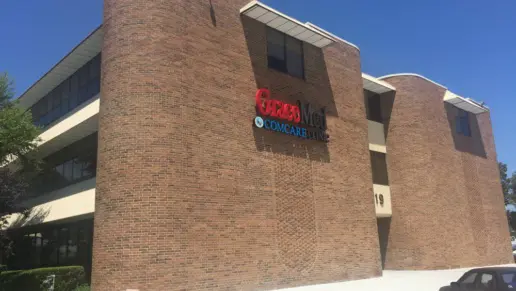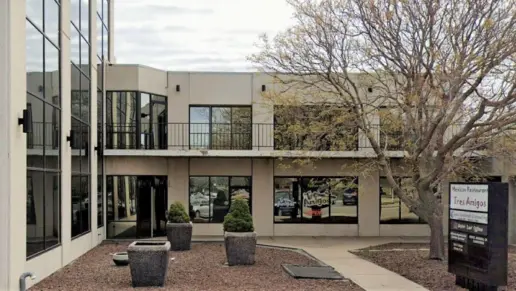The environment that is lived in this place is incredible to recover, valley hope is a wonderful place, the service I received was of first quality. I hope God continues to bless them so that they continue to save lives.
About Valley Hope of Atchinson
Valley Hope of Atchison provides a semi private residential recovery environment in a relaxed and rural setting near the Missouri River. They’re located in Atchison, Kansas, just 35 miles north of the Kansas City airport off I-435 and minutes from the Amelia Earhart Museum. They serve adults over 18 including veterans and active service members. Their specialty is medical detox and inpatient/residential treatment. They can also address co-occurring disorders. This is when someone is simultaneously dealing with mental health and substance use disorders. In addition, they provide virtual family care to support and guide families during the recovery process.
They’re reputed for compassionate and individualized residential care. This is coordinated by a team of clinical experts in a comfortable environment that supports healing and recovery. Their accreditation by the Joint Commission validates their commitment to quality care.
Their medical detox involves comprehensive assessment, stabilization and 24/7 monitoring by care experts. Depending on your personalized treatment planning, these experts may provide medication assisted treatment. This uses FDA approved medication alongside counseling and therapy to manage opioid and alcohol withdrawal. This ensures your detox is safe and effective.
Following detox, you’ll ideally continue your recovery journey with their inpatient care. This structured program integrates the 12 Step model with evidence based practices delivered in groups and individual sessions. It involves intensive therapeutic sessions with round the clock support from the care professionals. You’ll participate in over 40 hours of individual therapy, 12 Step sessions and group counseling. Addiction education is also provided. Emphasis is on developing effective coping and relapse prevention strategies as well as life skills that support your recovery. This encompasses stress management, effective communication and healthy decision-making.
The program also boasts a spiritual component. This ensures a whole person recovery that addresses the psychological, physical and spiritual aspects of addiction. Their case management services involve care coordination, ongoing recovery support and connection to community resources like housing and medical care. This forms part of their discharge planning or aftercare support. This facility offers return to work assistance and lifelong recovery through their strong alumni program. Overall comments from past clients indicate positive experiences.
Rehab Score
Gallery
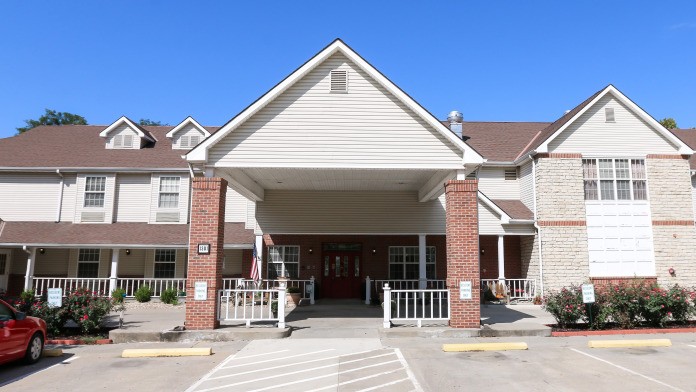
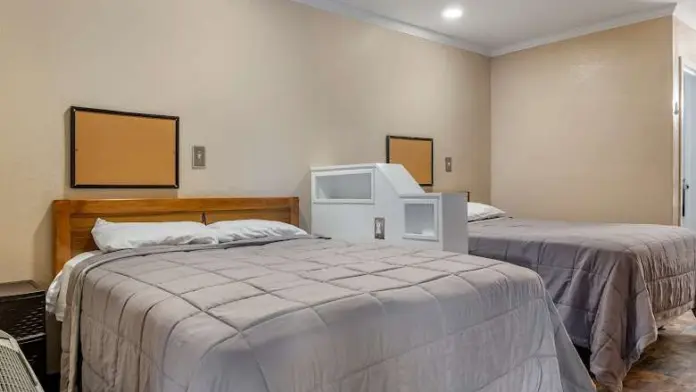
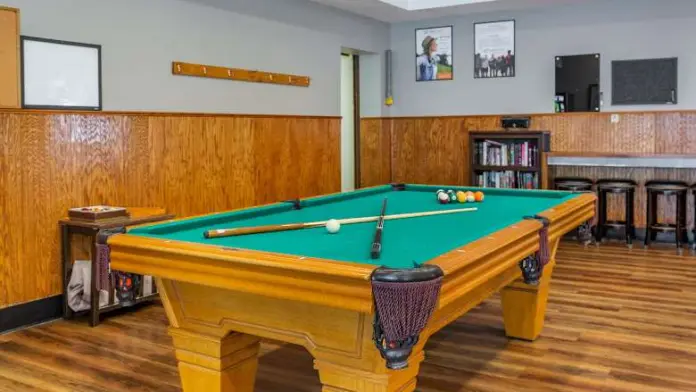
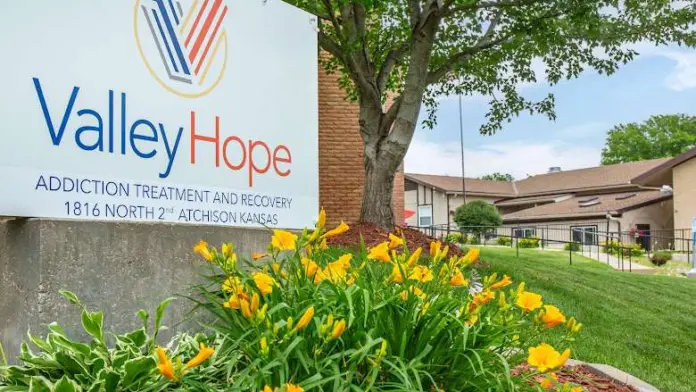
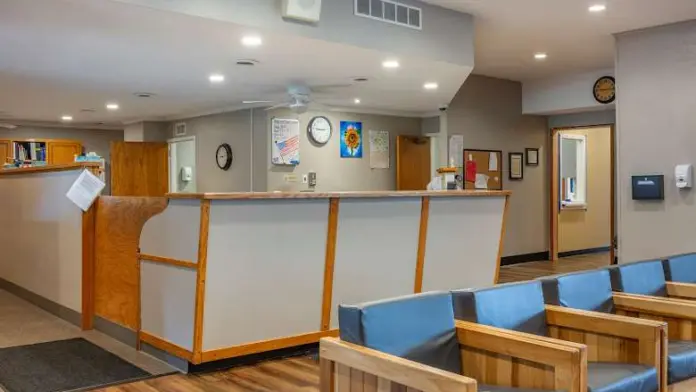
Location
Accepted Insurance
Other Forms of Payment
Private insurance refers to any kind of healthcare coverage that isn't from the state or federal government. This includes individual and family plans offered by an employer or purchased from the Insurance Marketplace. Every plan will have different requirements and out of pocket costs so be sure to get the full details before you start treatment.
Self-pay involves paying for treatment out of your own pocket. You can use savings or credit, get a personal loan, or receive help from family and friends to fund your treatment. If you don't have insurance or your insurance plan doesn't cover a specific program, self-pay can help ensure you still get the care you need.
Financial aid can take many forms. Centers may have grants or scholarships available to clients who meet eligibility requirements. Programs that receive SAMHSA grants may have financial aid available for those who need treatment as well. Grants and scholarships can help you pai for treatment without having to repay.
Military members, veterans, and eligible dependents have access to specific insurance programs that help them get the care they need. TRICARE and VA insurance can help you access low cost or no cost addiction and mental health treatment. Programs that accept military insurance often have targeted treatment focused on the unique challenges military members, veterans, and their families face.
Addiction Treatments
Levels of Care
Treatments
The goal of treatment for alcoholism is abstinence. Those with poor social support, poor motivation, or psychiatric disorders tend to relapse within a few years of treatment. For these people, success is measured by longer periods of abstinence, reduced use of alcohol, better health, and improved social functioning. Recovery and Maintenance are usually based on 12 step programs and AA meetings.
The length, intensity, setting, and treatment methods vary for each drug rehab in Kansas. Plans of care can be tailored to meet each person's own unique situation and needs. With the right program, individuals can successfully achieve long-term sobriety.
Opioid rehabs specialize in supporting those recovering from opioid addiction. They treat those suffering from addiction to illegal opioids like heroin, as well as prescription drugs like oxycodone. These centers typically combine both physical as well as mental and emotional support to help stop addiction. Physical support often includes medical detox and subsequent medical support (including medication), and mental support includes in-depth therapy to address the underlying causes of addiction.
Substance rehabs focus on helping individuals recover from substance abuse, including alcohol and drug addiction (both illegal and prescription drugs). They often include the opportunity to engage in both individual as well as group therapy.
Programs



Clinical Services
Cognitive Behavioral Therapy (CBT) is a therapy modality that focuses on the relationship between one's thoughts, feelings, and behaviors. It is used to establish and allow for healthy responses to thoughts and feelings (instead of unhealthy responses, like using drugs or alcohol). CBT has been proven effective for recovering addicts of all kinds, and is used to strengthen a patient's own self-awareness and ability to self-regulate. CBT allows individuals to monitor their own emotional state, become more adept at communicating with others, and manage stress without needing to engage in substance abuse.
During dialectical behavior therapy, you'll work with your therapist to learn new skills that allow you to better regulate your emotions. This treatment involves a pre assessment, individual therapy, skills training in groups, and telephone crisis coaching.
Group therapy is any therapeutic work that happens in a group (not one-on-one). There are a number of different group therapy modalities, including support groups, experiential therapy, psycho-education, and more. Group therapy involves treatment as well as processing interaction between group members.
When applying motivational interviewing, your therapist will ask open ended questions that encourage you to think differently about your challenges. They will also affirm your strengths and abilities. They will then offer empathy and reflect your thoughts back to you so you can identify any discrepancies in your current behaviors and your future goals.
The goal of trauma therapy is to address the lingering emotional and physical responses from witnessing or experiencing a traumatic event. Your therapist helps you develop strategies that manage your symptoms while processing the traumatic memories. This improves your overall well being and reduces your physical and emotional responses to triggers.
Couples therapy can help with problem solving, communication, forgiveness, and relationship satisfaction. This type of therapy is typically short term, and couples may meet with the therapist together as well as in separate sessions.
Substance use disorder (SUD) affects more than just the person struggling with the disease. It impacts every member of the family. At Valley Hope, they understand the problems families face and offer a range of programs designed to alleviate feelings of fear, guilt, frustration and resentment. Through compassion and understanding, they help families heal and recover together. They offer a variety of services for individuals, couples and families at our residential and outpatient treatment facilities. Individual, family and small group sessions explore emotional responses to addiction and consider positive ways of managing emotions. Interactive lectures help families understand the disease of addiction and learn behaviors that will support their loved one’s recovery. Designed to help families begin the healing process, Family Intensive Treatment (FIT) offers daily online group discussions facilitated by a family counselor, plus individual therapy online once a week. Online video conferences are held weekly in a live group session. FIT is offered to any person affected by a loved one’s substance use disorder. You do not have to have a family member at one of our centers in order to participate.
By learning life skills during rehab in Kansas, you can learn how to manage daily life in recovery. These skills will help you establish a new and independent life. They'll help you develop a healthy daily routine, practice self care, and cultivate healthy relationships.
Long term substance use causes chemical imbalances in the body that cause cravings, depression, and other conditions that perpetuate the cycle of addiction. Nutrition therapy addresses these imbalances by providing the foods your body needs for optimal function.
Amenities
-
Wifi
-
Residential Setting
-
Private Rooms
Accreditations

LegitScript has reviewed Valley Hope of Atchinson as part of their certification program, and has determined that it meets the LegitScript standards for legality, safety and transparency.
LegitScript verified in January 2017

The Joint Commission, formerly known as JCAHO, is a nonprofit organization that accredits rehab organizations and programs. Founded in 1951, the Joint Commision's mission is to improve the quality of patient care and demonstrating the quality of patient care.
Joint Commission Accreditation: Yes

The National Association of Addiction Treatment Providers (NAATP) is a professional association that represents organizations in the field of addiction services. Founded in 1978, NAATP's mission is to advance addiction services and ensure that high-quality addiction treatment is available and accessible.
NAATP Member: Yes
Contact Information
1816 North 2nd Street
Atchison, KS 66002




